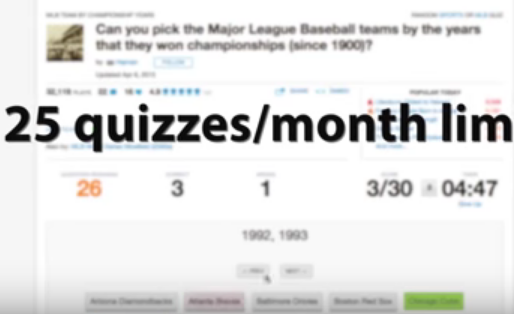This week we help you find the right tool for creating online quizzes, and we see how The Washington Post is redesigning the mobile experience.
PART 1: Online quiz tools
Interactive quizzes have become a popular way to engage online audiences, and new tools are making it simple to create and embed them into news-related websites. We walk through the features of four different tools: Playbuzz, Qzzr, Sporcle and ContentTools.
Reporting by Daniel Shapiro.
[To skip directly to this segment in YouTube, click here.]
Tools included in our report:
- PlayBuzz – Enables personality, trivia and gallery quizzes, plus polls, lists and flip cards. Free but quizzes maintain PlayBuzz branding. There’s also a customized white label option.
- Qzzr – Enables trivia and personality quizzes, plus interactive polls available with a paid plan. Free and lower-priced subscriptions have Qzzr branding on quizzes and limit the number of responses. Top-level subscription has no restrictions. There’s also a customized white label option.
- Sporcle – Offers personality, interpretive and trivia quizzes, with an option for quizzes to be timed. Free but with a limit of 25 public quizzes per month.
- ContentTools – All the standard quiz formats plus more sophisticated quiz options like rankings or image caption submission and up/down voting. Basic plans begin at $50 per month. More advanced/customized options also available.
PART 2: The Washington Post for iPhone and iPad
With its new app for Apple devices, The Washington Post aims to create a different kind of experience uniquely suited to mobile reading. We get details about the design-driven approach from Cory Haik, executive producer and senior editor for digital news, and Julia Beizer, director of mobile product.
Reporting by Berkeley Lovelace and Reuben Stern.
[To skip directly to this segment in YouTube, click here.]
Reuben Stern is the deputy director of the Futures Lab at the Reynolds Journalism Institute and host and co-producer of the weekly Futures Lab video update.
 The Reynolds Journalism Institute’s Futures Lab video update features a roundup of fresh ideas, techniques and developments to help spark innovation and change in newsrooms across all media platforms. Visit the RJI website for the full archive of Futures Lab videos, or download the iPad appto watch the show wherever you go. You can also sign up to receive email notification of each new episode.
The Reynolds Journalism Institute’s Futures Lab video update features a roundup of fresh ideas, techniques and developments to help spark innovation and change in newsrooms across all media platforms. Visit the RJI website for the full archive of Futures Lab videos, or download the iPad appto watch the show wherever you go. You can also sign up to receive email notification of each new episode.

